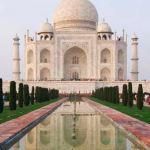India has closed its main tourist attraction, Taj Mahal, while the country’s prominent economic center has been instructed in works that do not provide basic services to keep half of its domestic workforce as part of anti-Corona virus measures in South Asia.
Mumbai, with a large population of 18 million, has also been permitted by hospitals and airport authorities to stamp the wrist of people who have been forced to isolate themselves with indelible ink reading “quarantine at home” included in the date of expiry of the quarantine.
- Sanders: The U.S. health system is not ready for coronavirus
The steps announced late Monday came a few days after the city closed schools, cinemas, commercial centers and gyms, and large gatherings were banned.
The state of Maharashtra in western India, where Mumbai is located, is most affected by the virus, with 39 cases, or nearly a quarter of the 126 cases, in the country.
“A patient in the state died after being infected with the virus on Tuesday, making it the third death in India,” Praveen Bardeche, the head of Mumbai’s local administration, told Reuters.
Besides the Taj Mahal, dozens of archaeological sites and museums have been closed, including the Ajanta Archaeological Village, Elora’s Caves, and religious sites such as the Sidevinayak Temple in Mumbai.
India expanded travel restrictions on Monday to ban entry for travelers from the European Union, the European Free Trade Association, Turkey and the United Kingdom.





